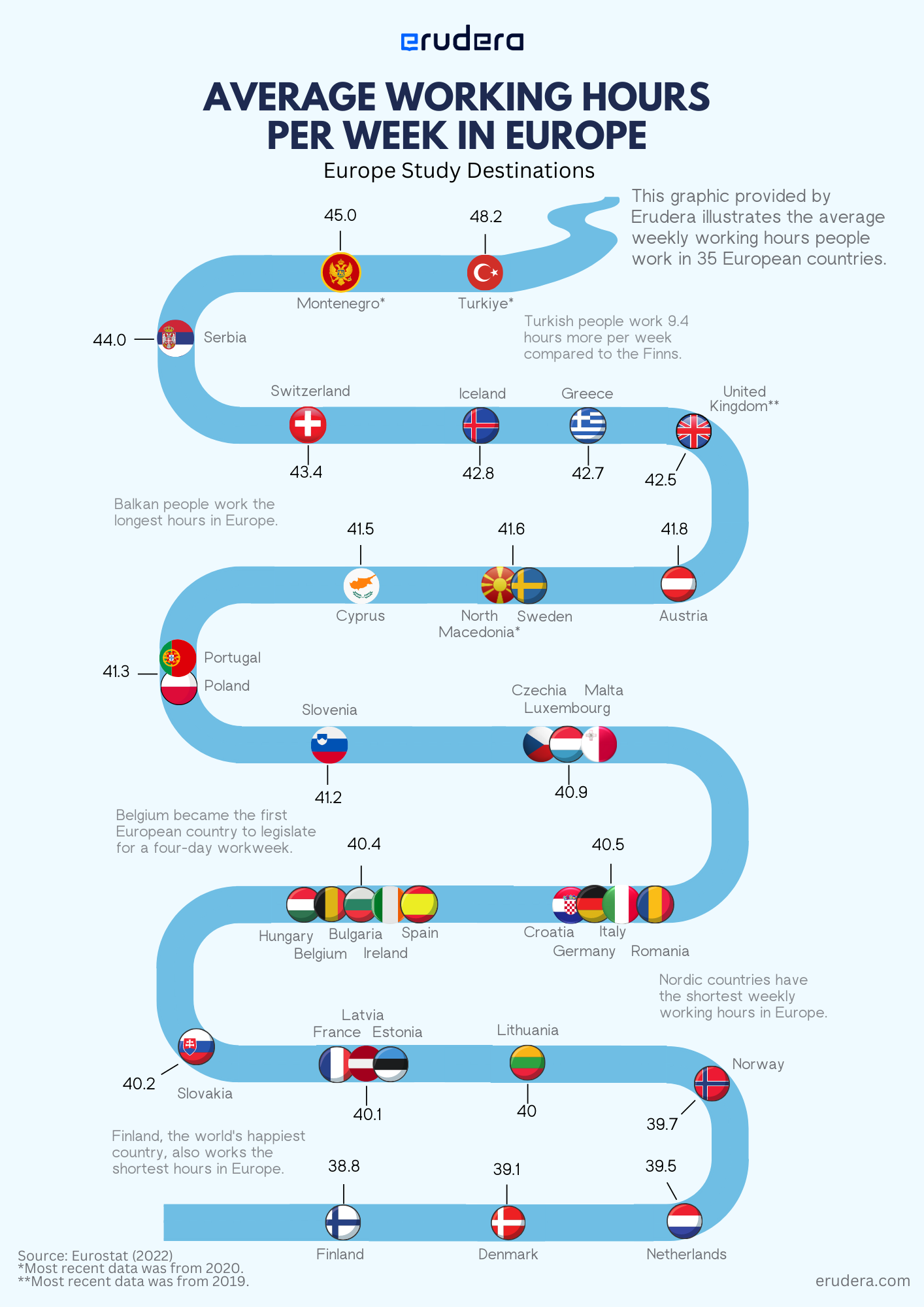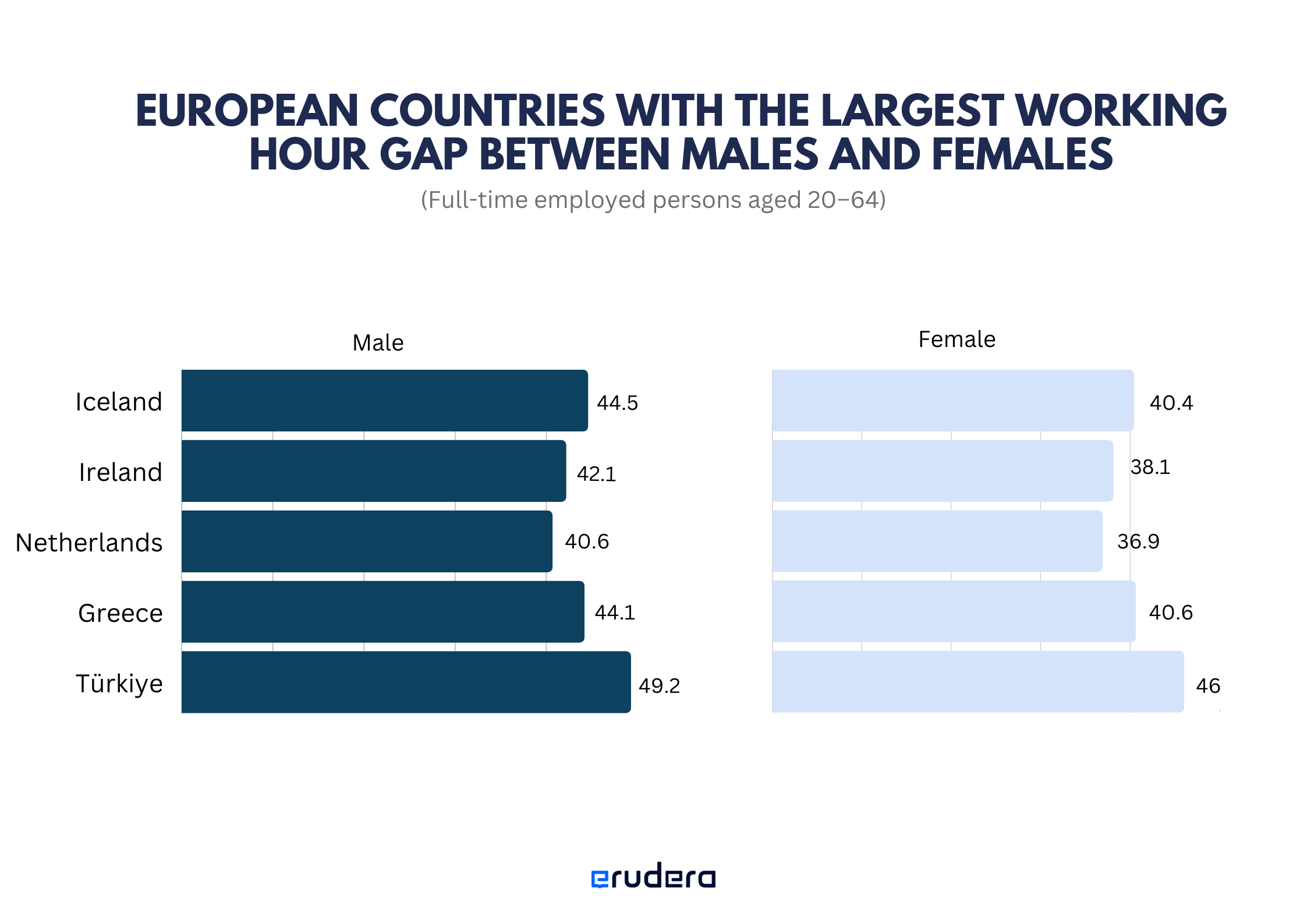Whether you're considering starting a career in a different country, curious about the work hours in various European nations, seeking the ideal place for work-life balance, looking for a study abroad destination where you can work after graduation, or anything else, really, keep reading!
Erudera has compiled and compared the average weekly working hours across European countries, revealing some interesting insights.
For example, did you know that two of the happiest countries in the world (Finland and Denmark) also work the shortest hours? Or that people in the Balkans work some of the longest hours per week and Nordic countries some of the shortest?
Find more information on the working hours in European countries below:
Highlights
- Türkiye has the longest work week, averaging 48.2 hours.
- Finland has the shortest workweek, with an average of 38.8 hours.
- If we compare the country with the longest working hours/week (Türkiye) with the shortest (Finland), there is a 9.4-hour gap between the two.
- Three of the top five countries with the longest working hours are observed in Balkan countries, respectively: Türkiye (48.2), Montenegro (45.0), and Serbia (44.0).
- On the other hand, three of the top five countries with the shortest working hours per week are observed in Nordic countries, specifically Finland (38.8), Denmark (39.1), and Norway (39.7).
- Iceland is the only Nordic country with the longest working hours.
- The World Happiness Report lists Finland as the happiest country in the world. Interestingly, Finland works the shortest hours in Europe (38.8).
- Montenegro works the longest part-time (28.1 hrs/week), meaning the Montenegrins work 10 hours longer than the Turkish, who have the shortest part-time workweek (18.1 hrs/week).

Average Full-Time Weekly Working Hours Across Europe
According to the information available, Turkish people work 9.4 hours more per week than people in Finland.
| Countries | Average Working Hours/Week (2022) |
|---|---|
| Türkiye* | 48.2 |
| Montenegro* | 45 |
| Serbia | 44 |
| Switzerland | 43.4 |
| Iceland | 42.8 |
| Greece | 42.7 |
| United Kingdom** | 42.5 |
| Austria | 41.8 |
| North Macedonia* | 41.6 |
| Sweden | 41.6 |
| Cyprus | 41.5 |
| Poland | 41.3 |
| Portugal | 41.3 |
| Slovenia | 41.2 |
| Czechia | 40.9 |
| Luxembourg | 40.9 |
| Malta | 40.9 |
| Croatia | 40.5 |
| Germany | 40.5 |
| Italy | 40.5 |
| Romania | 40.5 |
| Belgium | 40.4 |
| Bulgaria | 40.4 |
| Hungary | 40.4 |
| Ireland | 40.4 |
| Spain | 40.4 |
| Slovakia | 40.2 |
| Estonia | 40.1 |
| France | 40.1 |
| Latvia | 40.1 |
| Lithuania | 40 |
| Norway | 39.7 |
| Netherlands | 39.5 |
| Denmark | 39.1 |
| Finland | 38.8 |
Top 5 European Countries with the Longest Full-Time Working Hours
- The top five European countries with the highest number of hours worked per week are Türkiye (48.2), Montenegro (45.0), Serbia (44.0), Switzerland (43.4), and Iceland (42.8).
- Despite its unique geographical position, partly in Asia and partly in Europe, Türkiye still tops the list of European countries with the highest number of hours worked per week.
- Balkan countries Montenegro and Serbia follow close behind, with an average of 45.0 and 44.0 hours per week.
- The Swiss are also among people who work the longest hours, with a person working an average of 43.4 hours per week.
- Last but not least, Iceland is also among European workaholics, with an average of 42.8 hours worked per week.
The top three European countries with the highest hours of work are located in the Balkan Peninsula, including Türkiye (48.2), Montenegro (45.0), and Serbia (44.0).
Top 5 European Countries with the Shortest Full-Time Working Hours
- The top five European countries with the shortest number of hours worked per week are Finland (38.8), Denmark (39.1), Netherlands (39.5), Norway (39.7), and Lithuania (40.0).
- Did you know that according to World Happiness Report, Finland tops the list as the happiest country in the world? Coincidentally (or not), it also ranks first among the top European countries that work the shortest hours per week, an average of 38.8.
- Denmark is the second country whose people work the shortest hours per week, averaging 39.1 hours. Interestingly, Denmark also ranks as the second happiest country in the world, following Finland.
- The Netherlands (39.5) and Norway (39.7) rank third and fourth, respectively, with the shortest hours worked per week, both under 40.
- The average workweek for Lithuanians stands at 40 hours. This places Lithuania as the fifth European country with one of the shortest working hours in comparison.
Three out of five countries with the shortest working hours are in the Nordic region, including Finland (38.8), Denmark (39.1), and Norway (39.7).
EU Member Countries: Key Points
- Greece is the EU member country with the highest working hours, averaging 42.7 hours per week.
- Austria is close behind as the second EU member country with the highest weekly working hours, averaging 41.8 hours/week.
- Sweden is third, with an average of 41.6 hours/week, followed by Cyprus, with an average of 41.5 hours/week.
- Portugal and Poland both rank fifth among EU member countries with the highest weekly working hours, an average of 41.3 hours/week each.
- The shortest working hours per week among EU member countries are observed in Finland (38.8), Denmark (39.1), Netherlands (39.5), and Lithuania (40).
- In February 2022, Belgium became the first European country to legislate for a four-day week. The new law, effective November 21, 2022, allows employees to opt for a four-day or a five-day work week. According to the information available, people in Belgium work an average of 40.4 hours per week.
Non-EU Countries: Key Points
- None of the five countries in Europe with the highest average working hours are members of the European Union (EU).
- The non-EU country with the highest working hours per week is Türkiye. Turkish people work an average of 48.2 hours per week. Türkiye is closely followed by Montenegro (45.0), Serbia (44.0), Switzerland (43.4), and Iceland (42.8).
- People in the United Kingdom work an average of 42.5 hours per week. The UK is the 7th European country with the highest number of weekly working hours, according to the most recent information available for the UK, which was in 2019.
- People in Iceland work an average of 42.8 hours per week; meanwhile, Norwegians work an average of 39.7 hours per week. Both Nordic countries are part of the European Economic Area, with a significant difference of 3.1 hours in average weekly working hours.
Nordic Countries: Key Points
The Nordic countries included in this list are Denmark, Norway, Sweden, Finland, and Iceland.
- The longest weekly working hours among Nordic countries are observed in Iceland (42.8 hours), followed by Sweden (41.6 hours).
- The shortest weekly working hours among Nordic countries are observed in Finland (38.8), making Finland the European country with the shortest working hours per week among all 35 on the list.
- Closely following Finland is Denmark, with an average of 39.1 hours worked per week. After Denmark, an average of 39.7 hours worked per week are observed in Norway.
Part-Time Work: Longest & Shortest Hours per Week
According to the data, the Montenegrins (longest part-time work hours/week) work 10 hours longer per week on a part-time basis, compared to the Turkish (shortest part-time work hours/week).
Top 5 European Countries with the Longest Part-Time Working Hours
Montenegro works the longest part-time hours, an average of 28.1 hours per week, followed by Sweden (26.4), Romania (26.2), Belgium (25.2), and Serbia (24.9).
Top 5 European Countries with the Shortest Part-Time Working Hours
The European country with the shortest part-time working hours is Türkiye, with only 18.1 hours per week.
Following close behind are Portugal (18.6), Cyprus (19.3 hours), Norway (19.8 hours), and Spain (20.2 hours).
Sex-Based Disparity in Working Hours
Which countries have the largest working hour gap between males and females?
Some European countries significantly differ in full-time working hours between males and females.
- The information shows that males work longer full-time hours per week than females.
- Iceland has the biggest gap between the sexes, a difference of 4.1 hours, with males working 44.5 hours and females 40.4 hours per week.
- Ireland is the second country with the biggest working hour gap, where males employed full-time work 4 hours more than females.
- In the Netherlands, this gap declines to 3.7 hours, with males still working longer than females.
- In Greece, males work 3.5 hours more per week than females; meanwhile, in Türkiye, the gap stands at 3.4 hours.

| Countries | Full-time working hours (males) | Full-time working hours (females) | Difference |
|---|---|---|---|
| Iceland | 44.5 | 40.4 | 4.1 |
| Ireland | 42.1 | 38.1 | 4 |
| Netherlands | 40.6 | 36.9 | 3.7 |
| Greece | 44.1 | 40.6 | 3.5 |
| Türkiye | 49.2 | 46 | 3.4 |
Methodology
Data Source: The data for this research is obtained from Eurostat, the statistical office of the European Union, and includes information on the average weekly working hours for various European countries.
Data Collection: The data was collected for the year 2022, representing the most recent available information for the majority of the countries analyzed. However, certain countries had limitations in terms of data availability. Notably, the latest data for Turkey, Montenegro, and North Macedonia was from 2020, while the data for the UK was sourced from 2019.
Country Selection: The countries included in this study were chosen based on data availability. The focus was primarily on countries with the highest and lowest average working hours per week.
Population Selection: This research focuses on full-time employed persons aged 20 to 64. This demographic was selected to ensure consistency and comparability in the data across the countries analyzed.
Data Analysis: The collected data was sorted in descending and ascending order to identify the countries with the longest and shortest working hours per week.
Conclusion: This research sheds light on the discrepancies in average working hours across European countries for full-time employed individuals aged 20 to 64. The findings provide insights into regional trends and differences in work-life balance, contributing to a better understanding of European labor dynamics.